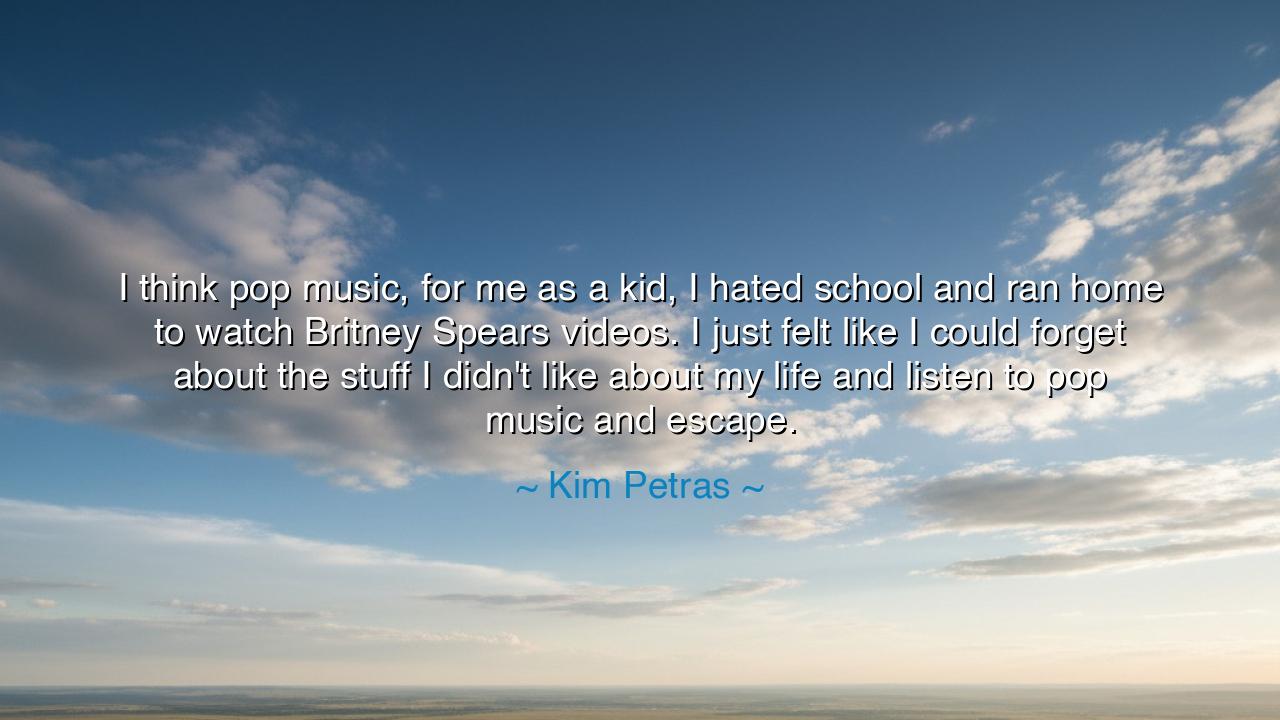
I think pop music, for me as a kid, I hated school and ran home
I think pop music, for me as a kid, I hated school and ran home to watch Britney Spears videos. I just felt like I could forget about the stuff I didn't like about my life and listen to pop music and escape.






In the ancient rhythm of human longing, the words of Kim Petras echo like a modern hymn: “I think pop music, for me as a kid, I hated school and ran home to watch Britney Spears videos. I just felt like I could forget about the stuff I didn’t like about my life and listen to pop music and escape.” These words, though born in the age of neon lights and digital song, speak to an ageless yearning—the desire to find beauty amid burden, to find freedom in the midst of constraint, to escape the heaviness of the world through the sanctuary of art.
In the days of old, when the poets of Greece and the mystics of the East sang of divine inspiration, they too sought escape, though not in rhythm and melody as we know them now, but in the music of the soul. The lyres of Orpheus and the hymns of Sappho were their pop music, for they gave to the weary heart the same refuge that Petras found in the radiant spectacle of Britney Spears. The origin of her quote is thus not merely personal—it is the continuation of a sacred tradition. Each generation finds its own temple of sound, its own way of healing the heart’s invisible wounds through music and imagination.
When Petras speaks of hating school and fleeing to the shimmering world of pop, she reveals the heart of the exile—the one who feels alien in the ordinary and seeks meaning beyond routine. The school represents the gray walls of conformity, while pop music, bright and defiant, becomes a gate into the infinite. Through rhythm and motion, through glitter and defiance, she found escape—not as a coward’s flight, but as the artist’s pilgrimage toward selfhood. For in those moments, she was not a child trapped in discontent, but a dreamer reborn in song.
There is an ancient mirror to this tale in the story of Mozart, who as a boy of prodigious talent found himself imprisoned by the expectations of court and crown. He too turned to music as his sanctuary, pouring his soul into notes that defied the confines of his world. Just as Petras found deliverance in the joyous rebellion of pop, Mozart found transcendence in his divine compositions. The instruments may differ—one electronic, one orchestral—but the heart’s movement is the same: the transformation of suffering into art, of pain into rhythm, of confinement into creation.
This is the hidden teaching within Petras’s confession: that art—even the art deemed “simple” or “commercial”—holds the power to heal. To the eyes of the proud, pop music may seem trivial; yet to the heart that listens, it becomes a refuge, a teacher, a light. The ancient bards would have recognized in it the same flame that burned in their own songs—a light that leads the soul away from despair and toward hope.
The wisdom, therefore, lies not in the kind of music one hears, but in the way one allows oneself to feel. To listen deeply, to let sound and story awaken the sleeping courage within—that is the true art. Whether it is the soaring voice of a pop icon or the trembling strings of a harp, what matters is the listener’s willingness to be moved, to be transformed, to let the melody remind them that they are still alive and capable of joy.
From Petras’s words, the lesson for all who hear is this: when the world grows cold and the heart feels weary, do not be ashamed to seek refuge in what brings you light. Let music—or whatever form of beauty speaks to your soul—be your companion in struggle. Do not silence your yearning for escape, for within that yearning lies the seed of renewal.
And so, children of tomorrow, remember this: there will be days when the world feels gray and the weight of duty bears heavy upon your shoulders. In those hours, run—not from life, but toward your sanctuary of sound, your garden of inspiration. For as Kim Petras once fled into the rhythm of pop, so too can you flee into your art, your dreams, your calling. There, within the pulse of what you love, you will find not escape—but freedom.






AAdministratorAdministrator
Welcome, honored guests. Please leave a comment, we will respond soon